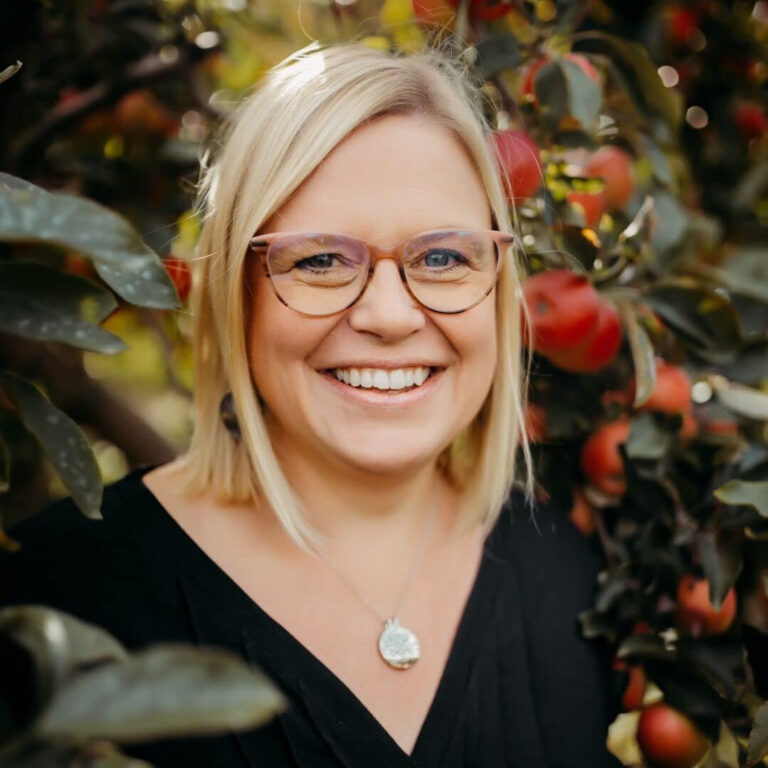My first novel comes out in the fall. Written for a middle-grade audience, it’s a novel in verse that grew from the seed of a story about the German POWs who picked apples during World War II in what would become my grandfather’s orchard.

The book, which takes place during one apple season — September until November of 1944 — will be released on September 12, 2023, nearly the same day that the story begins 79 years before.
During the long months of querying publishers and collecting rejections, I held out hope for a fall book. I prayed that someone would be drawn to the story and understand it needed to be a fall release.
I’m incredibly grateful that has happened, but now, I find myself occupying my spring months in a way quite like the way I’ve watched my dad and grandpa, apple farmers, spend their springs: hopeful, but nervous, powerless to do much more than wait out the tenuous weather. Weeks spent praying for just the right conditions in which the apple blossoms will bloom without being exposed to a late spring frost. These are tender months.
Being in this in-between season has helped me to better understand a farmer’s reality: the helplessness of doing what you can with your hands, then standing by the window in the middle of a cold night, staring out into the darkness, and waiting, praying. It’s a season of hopefulness tinged with vulnerability, an awareness of how little is really in our control.

In the spring, while keeping his eyes on the blossoms, my dad busies his hands by fixing equipment, mulching the tree limbs he pruned during the winter, trimming brush, and applying fertilizer. He does what he can.
In these middle months, I also search for ways to distract myself from worrying: I might have a bit of final proofreading or an occasional question from the typesetter to answer. But mostly I feel distracted by figuring out what it means to “market” myself. I’m finding it difficult to keep my balance as my words get ready to enter the world, and I feel simultaneously terrified and excited to consider things like followers, likes, and reviews.
My publisher and I also have sent out advance reader copies and asked fellow authors and KidLit promoters if they might graciously consider reading, and then, if so moved, be willing to share a few words. The process of asking for endorsements has been humbling, but mostly encouraging. The writing community is, by and large, a kind, gentle, supportive bunch.
But I did receive one piece of critical feedback, and must admit it rocked me to my core. Within hours, I had managed to convince myself the entire book was a catastrophe and imagined spending September in hiding rather than promoting.
Frederick Buechner writes that “the place God calls you is the place where your deep gladness and the world’s deep hunger meet.” I think I have too long idealized this idea of vocation, even as I have admired those words. Buechner’s quotation is one that at first glance appears idyllic, one we might see framed on a wall or posted online, the words set against a beautiful mountain backdrop.

In reality is that this place — where our deep gladness and the world’s deep hunger meet— is risky. It requires something of us; will make us feel exposed, vulnerable, and inadequate. I know of no one who is in the business of attempting to address the world’s deep hunger who would say their work always feels easy or who never doubts whether it may even be possible.
What Buechner’s words are not quoted as much are those that build up to his famous quotation on vocation. When, in Wishful Thinking, he says, “There are all different kinds of voices calling you to all different kinds of work, and the problem is to find out which is the voice of God rather than of Society, say, or the Super-ego, or Self-Interest.”
It was Good Friday when I read the difficult email that contained some critical feedback, and it wasn’t until I was in church Easter morning, three days later, that I finally felt some weight fall from my shoulders. Though I felt less no vulnerable and no less exposed, the melody of the music, the breaths that come more easily while singing, and the words of my pastor provided a space for my restless heart to settle. I also began to contemplate whether maybe I had begun to tie my work a little too closely to what others had to say about it. Maybe I had, as Beuchner warned, begun to become a bit too attentive to other kinds of voices calling me, those voices of “Society, the Super-ego, or Self-Interest.
That resurrection service was a reminder that my work can’t and won’t save me; that there is nothing more I need to do, prove, or succeed at in order to be loved. It was also a reminder that when we do the things we feel called to do, there is risk and heartache involved.
And yet, that’s not a reason to stop. Because maybe, even if our sense of self needn’t be defined by our work, God still uses it to refine us. God still uses it to bring us some gladness, and to feed others.
In several months, I’ll pick apples straight from the trees. As their sweetness fills my mouth, I’ll remember what they have survived to get there. I’ll remember those cold spring mornings, the transformation of the tender pink blossoms to the harvest of full fruit. And I’ll remember that one’s vocation, whether it’s growing fruit, writing a novel, raising a child, or cleaning a kitchen — lies somewhere between need and gladness, somewhere between risk and being safely held in a story bigger than our own.
Blossom photo by Dominik Scythe on Unsplash
Orchard photo by Pascal Debrunner on Unsplash

